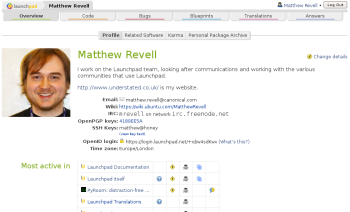This week in Launchpad’s web API
Friday, August 29th, 2008Last week the Launchpad web service didn’t change, because the source tree was frozen pending a Launchpad release. But this week we landed the branches we wrote last week, as well as some new ones.
The biggest change this week is client-side caching. Update your copy of launchpadlib to revision 17 and change your scripts to pass a directory name into the Launchpad constructor. That directory will be used as a cache.
>>> cachedir = "/home/me/.launchpadlib/cache/"
>>> launchpad = Launchpad(credentials, STAGING_SERVICE_ROOT, cachedir)
Without the cache, it takes several seconds just to start up launchpadlib. Every time you create a Launchpad object, the library has to download information about how Launchpad
works. With the cache in place, launchpadlib will download that information once and reuse it for every Launchpad object you create. The cache will also store the bugs, people, and other objects you retrieve as you use launchpadlib. The more often you use the same Launchpad objects, the more time the cache will save you. When we change Launchpad, launchpadlib will notice and will download the documents that have changed.
Second, Edwin Grubbs continued his work on publishing the Launchpad registry. launchpad.projects is now open for business. You can get basic information about Launchpad projects, their milestones and branches.
>>> bzr = launchpad.projects['bzr']
>>> bzr.title
u'Bazaar Version Control System'
>>> bzr.programming_language
u'Python'
>>> [milestone.name for milestone in bzr.all_milestones]
[u'0.9a', u'1.3.1rc1', u'1.4rc2', u'1.5', u'1.6', ...]
Finally, I’ve given launchpadlib some code that uses the client-side cache to avoid the “lost update problem.” This happens when two people modify the same object without coordinating, and the second one unknowingly overwrites the first person’s changes. If you use launchpadlib to make a change and it turns out someone else has changed the same object, you’ll get a chance to look at the new version of the object and see if your changes are still relevant.
One thing we haven’t done yet is gotten the API HTML reference to be regenerated whenever we change the web service. I planned to work on this yesterday, but instead spent the day fixing bugs. I’m working on it now and we should have it up early next week.
Next week we’ll see also more of the Launchpad registry exposed, and some long-awaited aspects of Launchpad’s bug tracker. And on Tuesday, Barry Warsaw and I will be talking about Launchpad’s web service API as part of Ubuntu Developer Week. That’s at 1900 UTC, in #ubuntu-classroom on irc.freenode.net.


 With the release of Launchpad 2.0, we’ve introduced a new, simpler, design and navigation.
With the release of Launchpad 2.0, we’ve introduced a new, simpler, design and navigation.